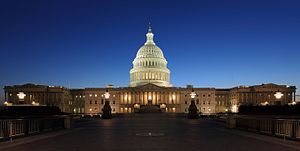
Insider trading is the trading of a public company's stock or other securities based on material, nonpublic information about the company. In various countries, some kinds of trading based on insider information are illegal. This is because it is seen as unfair to other investors who do not have access to the information, as the investor with insider information could potentially make larger profits than a typical investor could make. The rules governing insider trading are complex and vary significantly from country to country. The extent of enforcement also varies from one country to another. The definition of insider in one jurisdiction can be broad and may cover not only insiders themselves but also any persons related to them, such as brokers, associates, and even family members. A person who becomes aware of non-public information and trades on that basis may be guilty of a crime.

Dianne Goldman Berman Feinstein is an American politician who is in her sixth term as United States senator from California, since winning a special election in 1992. During her entire Senate tenure, she has been the state's senior senator. A member of the Democratic Party, she served three terms as mayor of San Francisco from 1978 to 1988.

The United States Senate Select Committee on Intelligence is dedicated to overseeing the United States Intelligence Community—the agencies and bureaus of the federal government of the United States that provide information and analysis for leaders of the executive and legislative branches. The Committee was established in 1976 by the 94th Congress.
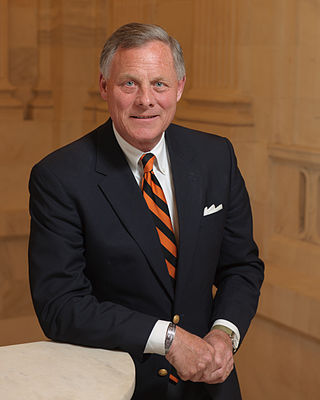
Richard Mauze Burr is an American businessman and politician who served as a United States senator from North Carolina from 2005 to 2023. A member of the Republican Party, Burr was previously a member of the United States House of Representatives.

Sheldon Whitehouse is an American lawyer and politician serving as the junior United States senator from Rhode Island since 2007. A member of the Democratic Party, he served as a United States Attorney from 1993 to 1998 and the 71st attorney general of Rhode Island from 1999 to 2003.
Securities fraud, also known as stock fraud and investment fraud, is a deceptive practice in the stock or commodities markets that induces investors to make purchase or sale decisions on the basis of false information. The setups are generally made to result in monetary gain for the deceivers, and generally result in unfair monetary losses for the investors. They are generally violating securities laws.

The Stop Trading on Congressional Knowledge (STOCK) Act of 2012 is an Act of Congress designed to combat insider trading. It was signed into law by President Barack Obama on April 4, 2012. The law prohibits the use of non-public information for private profit, including insider trading by members of Congress and other government employees. It confirms changes to the Commodity Exchange Act, specifies reporting intervals for financial transactions.
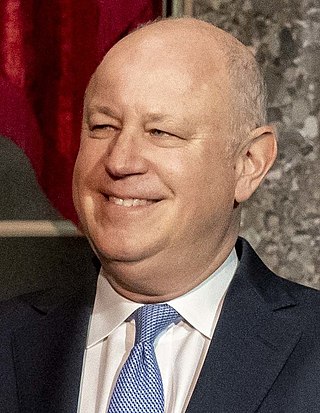
Jeffrey Craig Sprecher is an American businessman, the founder, chairman, and CEO of Intercontinental Exchange, and chairman of the New York Stock Exchange.

David Alfred Perdue Jr. is an American politician and business executive who served as a United States senator from Georgia from 2015 to 2021. A member of the Republican Party, Perdue was an unsuccessful candidate for Governor of Georgia in 2022.
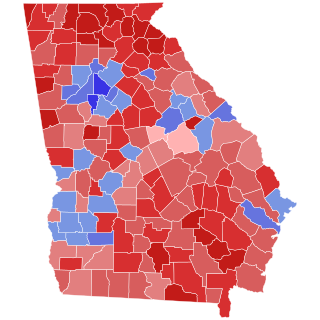
The 2020–21 United States Senate election in Georgia was held on November 3, 2020, and on January 5, 2021, to elect the Class II member of the United States Senate to represent the State of Georgia. Democrat Jon Ossoff defeated incumbent Republican Senator David Perdue in the runoff election. The general election was held concurrently with the 2020 presidential election, as well as with other elections to the Senate, elections to the U.S. House of Representatives and various state and local elections.

Thomas Jonathan Ossoff is an American politician serving as the senior United States senator from Georgia since 2021. A member of the Democratic Party, Ossoff was previously a documentary filmmaker and investigative journalist.
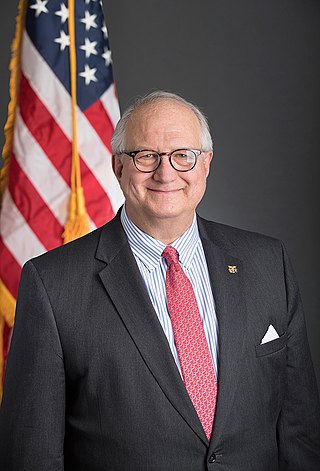
Gerald Fauth is an American businessperson who serves on the National Mediation Board (NMB). Fauth was first appointed to the NMB by President Donald Trump in 2017 and served as its Chairman from November 2017 to June 2018 and again from July 2021 to June 2022. Prior to joining the NMB, he was the president of G.W. Fauth & Associates Inc., a transportation economic consulting firm.

The 2020–21 United States Senate special election in Georgia was held on November 3, 2020, and on January 5, 2021, to elect the Class III member of the United States Senate to represent the State of Georgia. Democrat Raphael Warnock defeated appointed incumbent Republican Kelly Loeffler. The first round of the election was held on November 3, 2020; however, no candidate received a majority of the vote, so the top two candidates—Warnock and Loeffler—advanced to a runoff on January 5, 2021, which Warnock won narrowly.

Since 2016, then-presidential candidate Donald Trump and his allies have promoted several conspiracy theories related to the Trump–Ukraine scandal. One such theory seeks to blame Ukraine, instead of Russia, for interference in the 2016 United States presidential election. Also among the conspiracy theories are accusations against Joe Biden and his son Hunter Biden, and several elements of the right-wing Russia investigation origins counter-narrative. American intelligence believes that Russia engaged in a years long campaign to frame Ukraine for the 2016 election interference, that the Kremlin is the prime mover behind promotion of the fictitious alternative narratives, and that these are harmful to the United States. FBI director Christopher A. Wray stated to ABC News that "We have no information that indicates that Ukraine interfered with the 2016 presidential election" and that "as far as the [2020] election itself goes, we think Russia represents the most significant threat."

Kelly Lynn Loeffler is an American businesswoman and politician who served as a United States senator from Georgia from 2020 to 2021. Loeffler was chief executive officer (CEO) of Bakkt, a subsidiary of commodity and financial service provider Intercontinental Exchange, of which her husband, Jeffrey Sprecher, is CEO. She is a former co-owner of the Atlanta Dream of the Women's National Basketball Association (WNBA). Loeffler is a member of the Republican Party.

2020s in United States political history is a narrative summary of major political events and issues in the United States from January 1, 2020, through December 31, 2029. The first part is divided chronologically by Congressional sessions and the second part highlights major issues that span several years or even the entire decade. There are links for further information.

The COVID-19 pandemic was confirmed to have reached the U.S. state of North Carolina on March 3, 2020.

MeidasTouch is a liberal American political action committee formed in March 2020 with the purpose to stop the reelection of Donald Trump in the 2020 United States presidential election. The SuperPAC has aligned with the Democratic Party in the 2020 United States presidential election, the 2020–21 United States Senate election in Georgia, and the 2020–21 United States Senate special election in Georgia.

Misinformation related to the COVID-19 pandemic has been propagated by various public figures, including officials of the United States government. The Trump administration in particular made a large number of misleading statements about the pandemic. A Cornell University study found that former U.S. President Donald Trump was "likely the largest driver" of the COVID-19 misinformation infodemic in English-language media, downplaying the virus and promoting unapproved drugs. Others have also been accused of spreading misinformation, including U.S. Secretary of State Mike Pompeo, backing conspiracy theories regarding the origin of the virus, U.S. senators and New York City mayor Bill de Blasio, who downplayed the virus.

Several elections took place in the U.S. state of Georgia in 2022. The general election was held on November 8, 2022. A runoff election for one of Georgia's seats in the United States Senate was held on December 6, 2022. The runoff was scheduled because none of the candidates for Senate received 50% of the statewide vote in the general election. In addition to the Senate seat, all of Georgia's seats in the United States House of Representatives were up for election. Also up for election were all of Georgia's executive officers and legislative seats, as well as one seat on the Georgia Public Service Commission. The Republican Party decisively won every single statewide office in Georgia except for the Federal Senate race which narrowly went Democratic in 2022.
